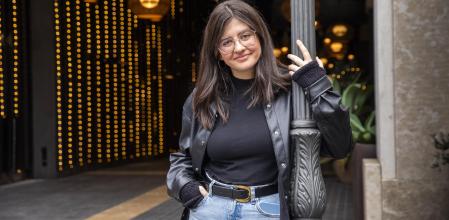
Author Julie Gilbert Discusses the Writing of Her New Book ‘Giant Love’
Julie Gilbert Today, we delve into the enduring relevance of the themes explored by Pulitzer Prize -winning author Edna Ferber
IN THE OPENING scenes of Yorgos Lanthimos’s Poor Things (2023), a slender, dark-haired woman in Victorian dress leaps into a large body of water to end her life. Against her will, she is rescued and reanimated. This heroine, we learn, is Bella Baxter (Emma Stone): a despairing wife turned Bride of Frankenstein, whose body has been resurrected using the brain of her unborn baby. But rather than directing us to Mary Shelley’s novel, the figure of the girl-woman provides an occasion to revisit a work by another female artist, one who has spent her career examining the unsettling proximity between childhood and adulthood: Jane Campion’s The Piano (1993). Like Poor Things , The Piano— released 30 years earlier—is a period drama about women’s sexual agency and entrapment, one whose closing sequence uncannily echoes that with which Lanthimos’s begins. Yet unlike Bella, who ultimately gets her say over the men who aim to control her, The Piano ’s heroine, Ada McGrath (Holly Hunter), continues, even decades later, to be defined by her muteness. In the wake of #MeToo, when Oprah’s question—“Was she silent, or was she silenced?”—reverberates through our culture, it is important to clarify that Ada is neither. She communicates in sign language with her daughter, Flora (Anna Paquin), who is the primary interpreter of her gestures. Crucially, then, what Ada cannot say is mediated by Flora, who utters the dark truths that her mother would rather bury. But this essay is no eulogy, for the problems of sexual injury and autonomy that The Piano addresses are very much alive today. They are made especially visible through the girl figures in Campion’s filmography, beginning with her early short, A Girl’s Own Story (1984). The girls of A Girl’s Own Story serve a crucial function: to expose the violence behind the erotic lives of adults. They repeatedly warn their older interlocutors against the dangers of confusing pleasure with intimacy, innocence with bliss, and promiscuity with maturity. But, as a result, these girls become subject to the very adult sexual dilemmas that they, like Flora, seek to condemn. At the heart […]
Click here to view original page at Replaying “The Piano”: Lessons from “A Girl’s Own Story”
© 2024, wcadmin. All rights reserved, Writers Critique, LLC Unless otherwise noted, all posts remain copyright of their respective authors.

Julie Gilbert Today, we delve into the enduring relevance of the themes explored by Pulitzer Prize -winning author Edna Ferber

The Mallorcan Joana Marcús is a young bestseller in Spain and America, writer of young adult novels with a romantic


